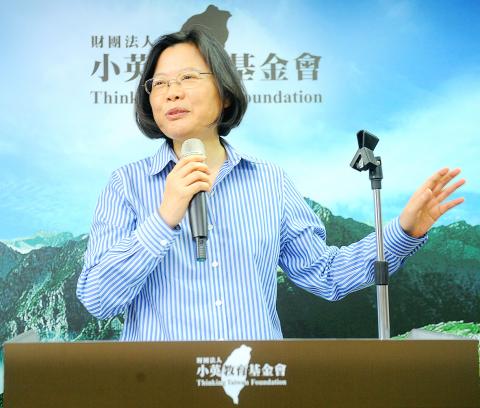Former Democratic Progressive Party (DPP) chairperson Tsai Ing-wen (蔡英文) yesterday officially announced the establishment of her foundation, the Thinking Taiwan Foundation, an organization which aims to develop charity projects and public policy.
“While it takes piles of cash to fill up a room, you can light up a room with a match. And that is what we’re trying to do,” said Tsai, who will chair the foundation, at the opening ceremony.
The foundation aimed to light three matches for Taiwan — deliberation and discussion of public policy, action to show compassion to local communities and acting as a catalyst for social action through participation, Tsai said of her first major move after losing the January presidential election.

Photo: Wang Min-wei, Taipei Times
“The ultimate goal would be to further the power of thinking, the power of action and the power of society,” said Tsai, whom many supporters expect to make another run for president in 2016.
Public policy is important because it would determine Taiwan’s future, which is bleak in many people’s eyes at present, she said.
Her foundation is determined to commit to charity works because over the years she has seen so many ordinary citizens and organizations get involved to help society move forward, she added.
The two primary goals are all about the people, she said.
“The most beautiful thing about Taiwan is its people. Without these passionate and sincere people, Taiwan would be a hollow place,” she said.
That was also why Tsai intended to make the foundation, which is funded from the NT$120 million (US$4 million) election subsidy Tsai received, free from political ideology and partisanship.
Among the board members of the foundation are former DPP secretary-general Su Jia-chyuan (蘇嘉全), Tsai’s running mate in the presidential election; former Chunghwa Telecom chairman Hochen Tan (賀陳旦); former deputy chairman of the Council for Economic Planning and Development Chang Ching-sen (張景森); journalist Antonio Chiang (江春男); and political commentator Yao Li-ming (姚立明).
Former finance minister Lin Chuan (林全) will serve as the foundation’s chief executive director.
The “Thinking Taiwan Forum” Web site, which was launched on Sunday, will play an integral part of public policy and social issues deliberation, Lin said.
The Web site will publish articles written by young professionals, academics, activists and prominent writers in six broad categories: including democracy, law, China affairs, economic affairs, society and culture.
The foundation also plans to hold open and closed-door conferences and workshops on various topics, Lin said.
According to Lin, the first closed-door conference on Taiwan’s future economic development model is scheduled to be held on Aug. 14 and Aug. 15. The conference will have panel discussions on macroeconomics, cross-strait economy, global economy, governance and a general discussion.
While the foundation will try to avoid political influence, Tsai will not shy from making political comments as a politician and a former presidential candidate, Lin said.
Tsai’s political affairs will be handled by her office, rather than the foundation, Lin said.

A strong continental cold air mass is to bring pollutants to Taiwan from tomorrow, the Ministry of Environment said today, as it issued an “orange” air quality alert for most of the country. All of Taiwan except for Hualien and Taitung counties is to be under an “orange” air quality alert tomorrow, indicating air quality that is unhealthy for sensitive groups. In China, areas from Shandong to Shanghai have been enveloped in haze since Saturday, the ministry said in a news release. Yesterday, hourly concentrations of PM2.5 in these areas ranged from 65 to 160 micrograms per cubic meter (mg/m³), and pollutants were

Taiwan’s armed forces have established response protocols for a wide range of sudden contingencies, including the “Wan Chun Plan” to protect the head of state, the Ministry of Defense (MND) said today. After US President Donald Trump on Saturday launched a series of airstrikes in Venezuela and kidnapped Venezuelan President Nicolas Maduro, concerns have been raised as to whether China would launch a similar “decapitation strike” on Taiwan. The armed forces regularly coordinate with relevant agencies and practice drills to ensure preparedness for a wide range of scenarios, Vice Minister of National Defense Hsu Szu-chien (徐斯儉) told reporters before a

EVA Airways on Saturday said that it had suspended a pilot and opened an investigation after he allegedly lost his temper and punched the first officer several times as their plane was taxiing before takeoff at Los Angeles International Airport. According to a report published on Thursday by The Reporter, the incident occurred after the flight’s Malaysian first officer tried to warn the Taiwanese pilot, surnamed Wen (文), that he was taxiing faster than the speed limit of 30 knots (55.6kph). After alerting the pilot several times without response, the first officer manually applied the brakes in accordance with standard operating

Japanese Councilor Hei Seki (石平) on Wednesday said that he plans to visit Taiwan, saying that would “prove that Taiwan is an independent country and does not belong to China.” Seki, a member of the Japan Innovation Party, was born in Chengdu in China’s Sichuan Province and became a naturalized Japanese in 2007. He was elected to the House of Concilors last year. His views on the Chinese Communist Party (CCP) — espoused in a series of books on politics and history — prompted Beijing to sanction him, including barring Seki from traveling to China. Seki wrote on X that he intends